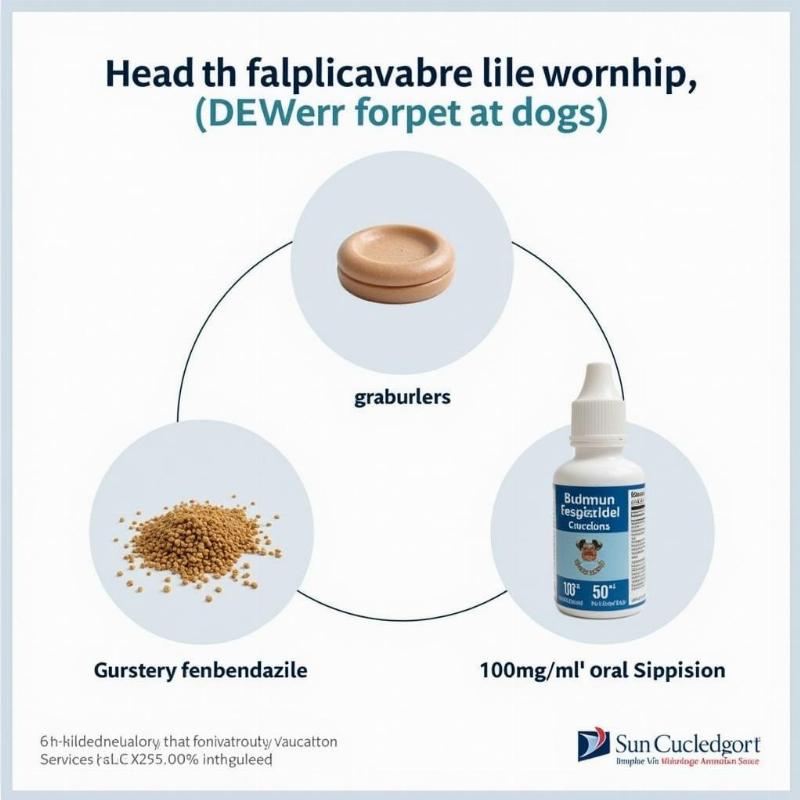Fenbendazole 100 mg/ml is a common broad-spectrum dewormer used for dogs in the United States. Understanding the correct fenbendazole 100 mg/ml dosage for dogs is crucial for effectively treating intestinal parasites while ensuring your dog’s safety. This guide provides a detailed overview of fenbendazole dosage, usage, potential side effects, and important considerations for dog owners in the US.
Understanding Fenbendazole for Dogs
Fenbendazole is effective against various roundworms, hookworms, whipworms, and some types of tapeworms. It works by disrupting the parasite’s metabolism, leading to their elimination. It’s available in various forms, including paste, suspension, and granules, but the 100 mg/ml oral suspension is a commonly prescribed concentration. Always consult with your veterinarian before administering any medication to your dog, even over-the-counter dewormers. They can accurately diagnose the specific parasite affecting your dog and prescribe the appropriate fenbendazole dosage and treatment duration.
Fenbendazole 100 mg/ml Dosage for Dogs: What You Need to Know
The typical fenbendazole 100 mg/ml dosage for dogs is 50 mg/kg (22.7 mg/lb) of body weight, given orally once daily for three consecutive days. However, the dosage and duration can vary depending on the specific parasite, the severity of the infestation, and your dog’s overall health. Your veterinarian will determine the optimal regimen for your dog’s individual needs. Never estimate the dosage or extend the treatment period without veterinary guidance.
 Different Forms of Fenbendazole Dewormer
Different Forms of Fenbendazole Dewormer
Potential Side Effects of Fenbendazole in Dogs
Fenbendazole is generally considered safe for dogs when administered at the correct dosage. However, some dogs may experience mild side effects, such as vomiting, diarrhea, or loss of appetite. If you observe any unusual symptoms after administering fenbendazole, contact your veterinarian immediately. In rare cases, more serious side effects, such as allergic reactions, can occur.
Is Fenbendazole Safe for Puppies and Pregnant Dogs?
The safety of fenbendazole in pregnant or lactating dogs and puppies younger than six weeks old has not been fully established. Therefore, it’s essential to consult your veterinarian before administering fenbendazole to these vulnerable groups. They can assess the risks and benefits and recommend the safest course of action.
Administering Fenbendazole to Your Dog
Administering the oral suspension can be done directly into your dog’s mouth using a syringe or mixed with a small amount of food. If mixing with food, ensure your dog consumes the entire portion to receive the full dose. Always follow your veterinarian’s instructions carefully.
Preventing Parasite Reinfestation in Dogs
Maintaining a clean living environment is essential to prevent reinfestation. Regularly clean up your dog’s feces, especially in your yard, to minimize environmental contamination. Discuss preventative parasite control measures with your veterinarian, such as heartworm medication that also offers broad-spectrum parasite protection.
Conclusion: Prioritizing Your Dog’s Health
Understanding the correct fenbendazole 100 mg/ml dosage for dogs is crucial for effectively treating intestinal parasites and safeguarding your canine companion’s health. Always consult your veterinarian for accurate diagnosis, appropriate dosage, and treatment duration. By following their guidance and implementing preventative measures, you can help keep your dog happy, healthy, and parasite-free.
FAQ:
- How long does it take for fenbendazole to work in dogs? Fenbendazole typically starts working within a few days, but the full effect may take up to a week.
- Can I buy fenbendazole over the counter? While some forms of fenbendazole may be available over-the-counter, it’s always recommended to consult your veterinarian before administering it to your dog.
- What should I do if my dog vomits after taking fenbendazole? Contact your veterinarian immediately for advice.
- How often should I deworm my dog? The frequency of deworming depends on your dog’s lifestyle, age, and risk factors. Consult your veterinarian for a personalized deworming schedule.
- Are there any natural alternatives to fenbendazole? While some natural remedies are touted for parasite control, their efficacy is often not scientifically proven. Discuss any alternative treatments with your veterinarian before trying them on your dog.
- Can I give my dog fenbendazole if they are on other medications? Inform your veterinarian about all medications your dog is currently taking to avoid potential drug interactions.
- How can I prevent my dog from getting worms in the first place? Regular veterinary check-ups, preventative medications, and maintaining a clean environment are key to preventing parasite infestations.
Beautdogs.us is your trusted resource for comprehensive dog care information, breed-specific guidance, and product recommendations. We cater to both new and experienced dog owners, empowering them with the knowledge to provide the best possible care for their canine companions. Our expert insights encompass everything from health and nutrition to training and grooming. For personalized advice and support, reach out to our team of dedicated pet professionals. Contact us via email at [email protected] or by phone at +1 501-555-7529. Beautdogs.us – Your partner in ensuring a happy and healthy life for your beloved dog.